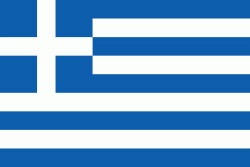Amorgos (Dimos Amorgos)
Amorgos (Αμοργός, Amorgós; ) is the easternmost island of the Cyclades island group and the nearest island to the neighboring Dodecanese island group in Greece. Along with 16 neighboring islets, the largest of which (by land area) is Nikouria Island, it comprises the municipality of Amorgos, which has a land area of 126.346 km² and a population of 1,973 (2011 census).
Due to its position near the ancient Ionian towns, such as Miletus, Halicarnassus and Ephesus, Amorgos became one of the first places from which the Ionians passed through to the Cycladic Islands and onto the Greek mainland.
Due to its position near the ancient Ionian towns, such as Miletus, Halicarnassus and Ephesus, Amorgos became one of the first places from which the Ionians passed through to the Cycladic Islands and onto the Greek mainland.
Map - Amorgos (Dimos Amorgos)
Map
Country - Greece
 |
 |
| Flag of Greece | |
Greece is considered the cradle of Western civilization, being the birthplace of democracy, Western philosophy, Western literature, historiography, political science, major scientific and mathematical principles, theatre and the Olympic Games. From the eighth century BC, the Greeks were organised into various independent city-states, known as poleis (singular polis), which spanned the Mediterranean and the Black Sea. Philip II of Macedon united most of present-day Greece in the fourth century BC, with his son Alexander the Great rapidly conquering much of the ancient world, from the eastern Mediterranean to the North Western parts of India. The subsequent Hellenistic period saw the height of Greek culture and influence in antiquity. Greece was annexed by Rome in the second century BC, becoming an integral part of the Roman Empire and its continuation, the Byzantine Empire, which was culturally and linguistically predominantly Greek.
Currency / Language
| ISO | Currency | Symbol | Significant figures |
|---|---|---|---|
| EUR | Euro | € | 2 |
| ISO | Language |
|---|---|
| EN | English language |
| FR | French language |
| EL | Greek language |















